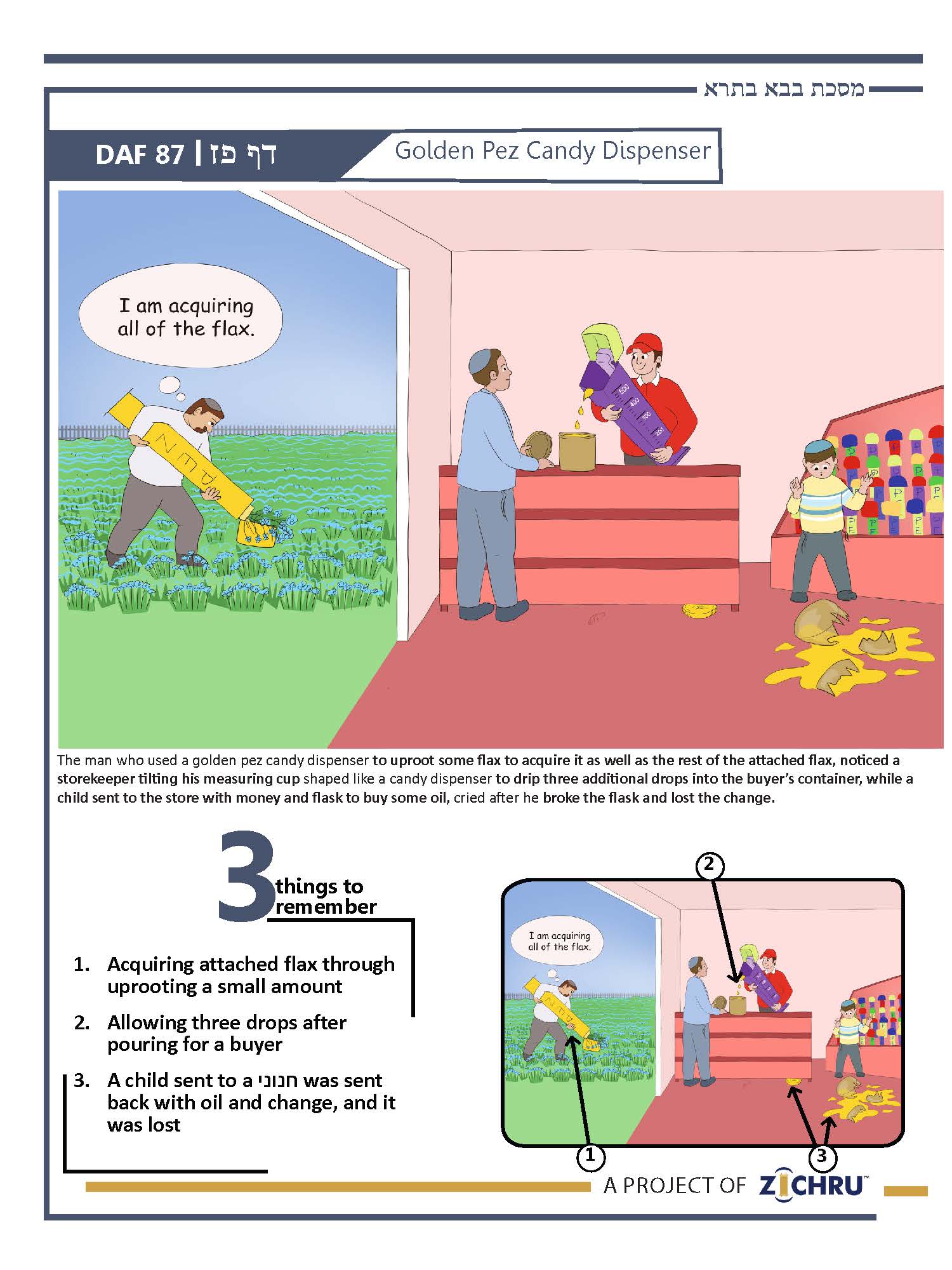Bava Basra - Daf 87
- Audio Timestamps
0:00 - The 3 Sugyos
2:46 - Review of 3 Sugyos
5:14- Siman
8:10 - 4 Blatt Back Chazarah
14:23 - Pop Quiz (Last 7 blatt)
For access to all Zichru resources including PDFs, and illustrations CLICK HERE
- Acquiring attached flax through uprooting a small amount
The Mishnah on Daf 84b taught that although one must normally lift flax to acquire it, if the flax was attached to the ground, and he uprooted a small amount, he acquired all of it. The Gemara asks: משום דתלש כל שהוא קנה – Just because he uprooted a small amount, he acquired all the other flax? How can a kinyan on one item enable him to acquire another? Rav Sheishess answers that the case is where the owner said: לך יפה לך קרקע כל שהוא – “Go improve a small amount of land for yourself, וקני כל מה שעליה – and thereby acquire whatever is on it.” Since uprooting some flax improves the land, it serves an a kinyan chazakah on the land, which can acquire any flax attached to the ground (which also has the status of land). The Rashbam adds this is effective even where he is not acquiring the land itself.
- Allowing three drops after pouring for a buyer, and the status of residue in the measuring cup
The next Mishnah states: וחייב להטיף לו שלש טיפין – [the seller] is required to let three drops drip out for [the buyer] from the measuring cup after pouring from it into the buyer’s container. הרכינה ומיצית – If he tilted it after allowing the three drops, and [residue] gathered at the bottom, it belongs to the seller. A חנוני – storekeeper is not required to allow three drops drip out for a buyer, because he is occupied with his sales. Rebbe Yehudah says he is only exempt on Friday just before Shabbos, as the Gemara explains.
Rebbe Elazar asked Rebbe Yitzchak bar Avdimi that another Mishnah teaches that if one tilted a barrel from which he had poured terumah oil, and residue collected inside, it has the status of terumah. If so, the residue in our case should belong to the buyer!? He answered that Rebbe Abahu explained our Mishnah: משום יאוש בעלים נגעו בה – it is because of the owner’s abandonment of the residue that they applied this, because it is not worth his time to wait for it. Still, the residue of terumah oil is terumah.
- A child sent to a חנוני was sent back with oil and change, and it was lost
The next Mishnah states: השולח את בנו אצל חנווני – if one sends his minor son to a storekeeper with a coin worth two issars to buy oil, and the storekeeper gave him the oil and an issar of change, and later the child broke the צלוחית – flask of oil and lost the issar, the Tanna Kamma holds the חנוני liable. Rebbe Yehudah exempts him, שעל מנת כן שלחו – because it was with this intention (that the oil and change should be sent with the child) that he sent him. The Gemara explains the machlokes regarding the coin and oil. The Rabbonon hold: לאודועי שדריה – [the father] sent him only to inform the חנוני of his desire for the purchase, but not to send the goods with him, and the חנוני was negligent for doing so. Rebbe Yehudah holds: לשדורי ליה שדרי' – he sent him so [the חנוני] would send him the goods with the child and is not responsible for the loss. The Gemara asks, however, why the חנוני should be responsible for the flask. Since the father sent it with the child, אבידה מדעת היא – it is an intentional loss!? Several answers are rejected, and it is ultimately answered on the next Daf.
Siman – Golden Pez Candy Dispenser
The man who used a golden Pez candy dispenser to uproot some flax to acquire it as well as the rest of the attached flax, noticed a storekeeper tilting his measuring cup shaped like a candy dispenser to drip three additional drops into the buyer’s container, while a child sent to the store with money and flask to buy some oil, cried after he broke the flask and lost the change.


